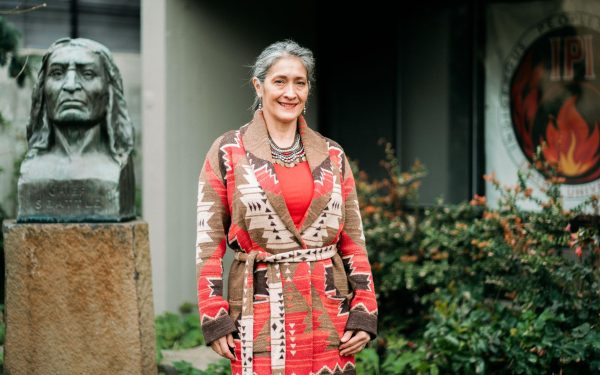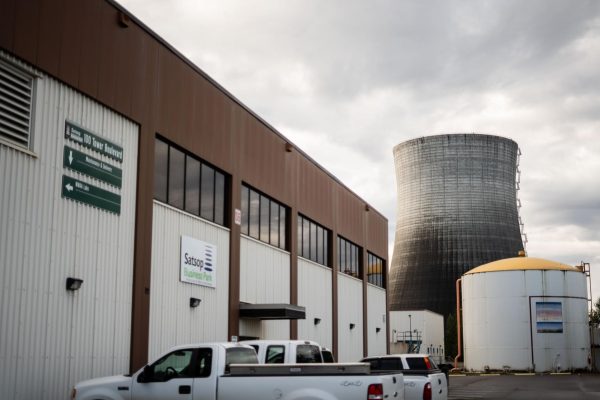President Peñalver Addresses State of the University
Each year, the needs and concerns of Seattle University change and grow, and with them, the university’s response. President Eduardo Peñalver gave his State of the University address April 27 to discuss this year’s developments. He provided a university update, detailed concerns and shared ideas to better the institution
Peñalver began the live-streamed event by outlining the main challenges Seattle U faces and how the administration plans to respond. He explained that undergraduate enrollment has been swiftly declining over the past years, and the university is predicting a 10% decline in its undergraduate population beginning 2026.
“The demographic cliff refers to the rapid decline in the population of 18-year-olds graduating from high school due to the drop off in births after the great recession in 2008,” Peñalver said during the event. “What’s more troubling is the amount of undergraduate enrollment out of the K-12 pipeline has been declining for several years even though the population of people graduating high school has been increasing over the same period.”
He conveyed that the lack of interest in higher education has affected universities on a national level in a largely politicized way, explaining that trust in higher education is significantly lower among self-identified Republicans than self-identified Democrats.
The address focused on current issues both within Seattle U and among higher education in general. Artificial intelligence (AI) and other new technologies that have disrupted established norms of higher education are some of these topics.
“Burying our heads in the sand is not an option,” Peñalver said. “We need to learn about these new technologies and deploy them and take advantage of the productivity that they offer.”
Peñalver was optimistic about the challenges facing Seattle U. He highlighted Seattle U’s unique geographical location and the post-grad opportunities Seattle provides.
“We are Seattle’s university. Seattle is the number one destination for college students after they graduate,” Peñalver said. “Our strategy is to make the most of our location and tap into the reasons why college students want to come here. [We are] creating opportunities for our students to intern and extern with local businesses, ensuring that we have opportunities that match our student’s interests and aspirations.”
Following Peñalver, three panelists gave insight into how Seattle U can improve overall and contribute to the well-being of the next generation of Redhawks. The panel was composed of Laura Vasilopoulos, assistant vice president for corporate and foundation relations, Charles Tung, special assistant to the provost for curriculum, and Trish Henley, associate provost for graduate, online and professional education.
Tung opened for the panelists, outlining a plan to reinvent the curriculum at Seattle U, focusing on the importance of intellectual growth in the face of pressing issues.
“The stakes could not be higher. Over the last few years all of us have been getting very clear glimpses of what will happen to individuals, to communities, to democracies, to nations and to the planet if we don’t prepare our students to face the unsustainability of our current world,” Tung said during the event.
Forming relationships with companies and foundations to provide connections for current and past students is a subject of interest for Vasilopoulos.
“Since coming to Seattle U in 2015, I have seen the interest and demand for engagement in companies and foundations just explode,” Vasilopoulos said during the event. “When it comes to corporate engagement, everyone has begun setting [their] sights ever higher. We are now well-positioned to secure support from prestigious national foundations.”
Henley was the last panelist to speak, covering Seattle U’s advancements in online and graduate education along with recent efforts to recruit students internationally. She discussed how current graduates will likely be involved in professions that don’t currently exist, creating new needs to be met by the university.
“[Students] are trying to solve increasingly complex problems in a globally connected and technologically savvy world, and we need to change to offer them the lifelong learning solutions that they need as they are going out on those journeys professionally and personally,” Henley said during the event.
Peñalver concluded the event with plans to contribute to students’ individual success, mentioning Seattle U’s Jesuit value of educating the whole person (cura personalis).
“[Seattle U] aims to instill knowledge, expertise and wisdom that inspires leaders for a just and humane world,” Peñalver said. “On a practical level, our Jesuit character means things like small class sizes and classes taught by professors and not graduate students: a curriculum that not only teaches students about new and distributive technology but gets them to engage critically with the limits.”
Seattle U will continue to evolve over the next year, adapting to the unique challenges presented by AI and decreased undergraduate enrollment among other new developments. However, Peñalver and the administration say they are confident that Seattle U’s unique location and values will allow it to thrive no matter what obstacles emerge.










